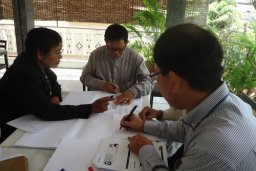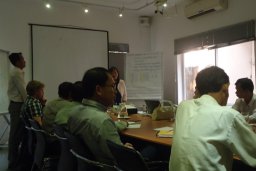Visit of the University of Leuven to VVOB Cambodia
From the 6th till the 12th of April 2014, a delegation of the University of Leuven (KU Leuven) made its first visit to VVOB Cambodia. They trained the VVOB team and a selected group of primary teacher trainers and officers of the Ministry of Education, Youth and Sport (MOEYS) on how to measure the effectiveness of mathematics education. Crucial, as VVOB Cambodia and MOEYS are together working on improving mathematics education in the primary teacher trainer centres (PTTCs) and practice schools in Cambodia.
Improving mathematics education in Cambodia
From 2014 to 2016 MOEYS and VVOB work together on improving mathematics education in the primary teacher trainer centres (PTTCs) and practice schools in Cambodia. Specifically, the focus will be on improving the pedagogical content knowledge (PCK) of teacher trainers and model teachers. Pedagogical content knowledge is a combination of content knowledge and methodology. PCK includes knowledge of instructional strategies, representations and students’ thinking. Improving the PCK of teachers is important as there is a clear link between the pedagogical content knowledge level of the teacher and the learning outcomes of the students. This makes clear that improving PCK of teacher trainers and model teachers is an important goal and that is why the new programme of VVOB in Cambodia focuses on PCK. But how do we know whether the programme is effective? Therefore, VVOB asked for the expertise from KU Leuven.
Expertise from KU Leuven
Two staff members and one student of KU Leuven came to Cambodia to assist VVOB Cambodia in the process of monitoring and evaluation of mathematics education. Patrick Van Roy (researcher) had experience in designing PCK-oriented rational number lesson series in Belgium and was involved in the pre- and post-test to measure the effectiveness of the given training.
He shared his experience with the VVOB staff and with a selected group of teacher trainers and ministry staff during a one-day input training. First he gave an overview of the research done around PCK and specifically in the field of rational numbers. This helped to make clear that the VVOB programme is not just focusing on pedagogical content knowledge based on its own preferences, but that it is something considered important in a wide range of literature. It made the importance of PCK more clear to the participants. In the second part of his training, there was more time for group work. The participants of the training worked together and deepened their knowledge and understanding of the content of the PCK pre- and post-tests. Last, the participants also got some inspiration on how to develop lesson series. This knowledge will be very relevant when they start developing manuals for mathematics and designing trainings for their colleagues.
The training gave very good input on how a pre- and post-test can measure the effectiveness of our mathematics education. But of course it is not possible to just use the in Belgian developed PCK-tests in Cambodia. They have to be contextualised and therefore Silke Vanspauwen (master student) joined the KU Leuven team. Together with the VVOB staff she adapted the tests to the Cambodian cultural context. An analysis was also made to compare the differences between the content of the PCK-test and the Cambodian curricula, existing manuals and text books. After all the adaptations were done, a try-out of this contextualised PCK-test was organised in Kandal. Present were also three staff members of the ministry who were asked to administer the test and take notes in case there would be any issues. Three model teachers and three teacher trainers took the test. The information gathered in this try-out helped to further adjust the test.
Marlies Lacante (professor) was the head of the delegation and oversaw everything. She gave an input training on research design and research errors, which was then made concrete by discussing the implications of this for the current programme in Cambodia. Her guidance in methodology contributed to the eventual design, as summarised in the next paragraph.
Methodology
In regard to sampling it was decided that all teacher trainers would participate in the PCK-test and training. Of all the model teachers who would receive training, only the ones of grade 4-6 would be subjected to the PCK-test. The test would be administered in three locations. The staff of different model schools and PTTCs would be gathering in clusters. After completion of the PCK-test, all the tests will be collected in a sealed box and be handed over for correction. They will pick out 15 tests that will be corrected independently by five pairs of correctors. The results of this correction will be registered and analysed, which will provide information on the inter scorer reliability. The remaining tests will then be divided over the different pairs. The correction will happen by some selected staff of PTTCs and MOEYS, but anonymity of the participants will be guaranteed. VVOB will then take up the responsibility for data entry and provide the information to KU Leuven, who can then start with data analysis.
Further cooperation
We are looking forward to the further cooperation with KU Leuven. And especially to their visit in September, when they will be giving training to the VVOB staff on data analysis. Many thanks to the KU Leuven team.







